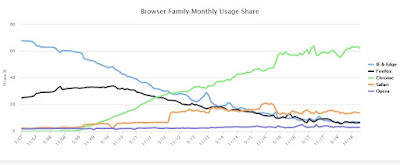Teachers of intro economics, as well as industrial organization classes, are often on the lookout for recent examples of market shares that can be used for talking about the extent to which certain markets are concentrated or competitive. The W3 Counter offers a monthly breakdown of market shares for browsers and platforms. For February 2019, here's a figure for internet browser market share:
Here's a figure showing patterns over time, and thus showing the substantial rise of Chrome and the mild rise of Firefox, and the corresponding falls of Internet Explorer/Edge and Safari. Depending on whether you are a glass half-full or half-empty person, you will have a tendency to see this either as proof that Google's Chrome has a worrisome level of market dominance, or as proof that even seemingly dominant browser market shares can fall in a fairly short time.
Finally, here's a table with the market share of various platforms in February 2019, but it needs to be read with care, since it lists multiple versions of Windows, Android, and ioS/Mac.






Leave your comments
Post comment as a guest